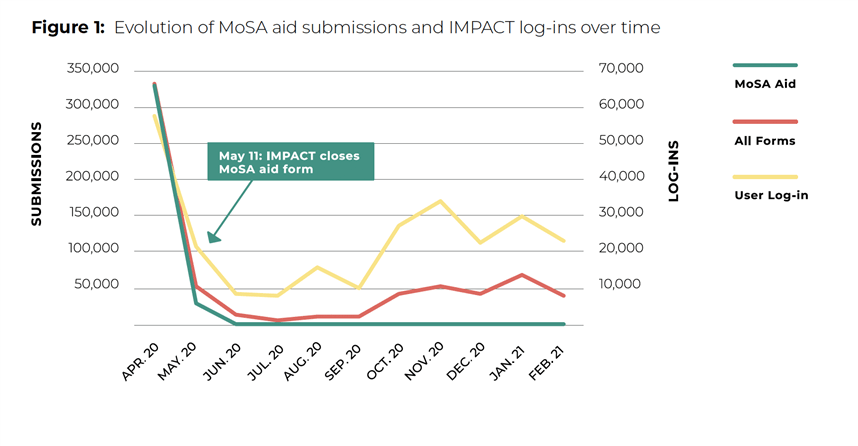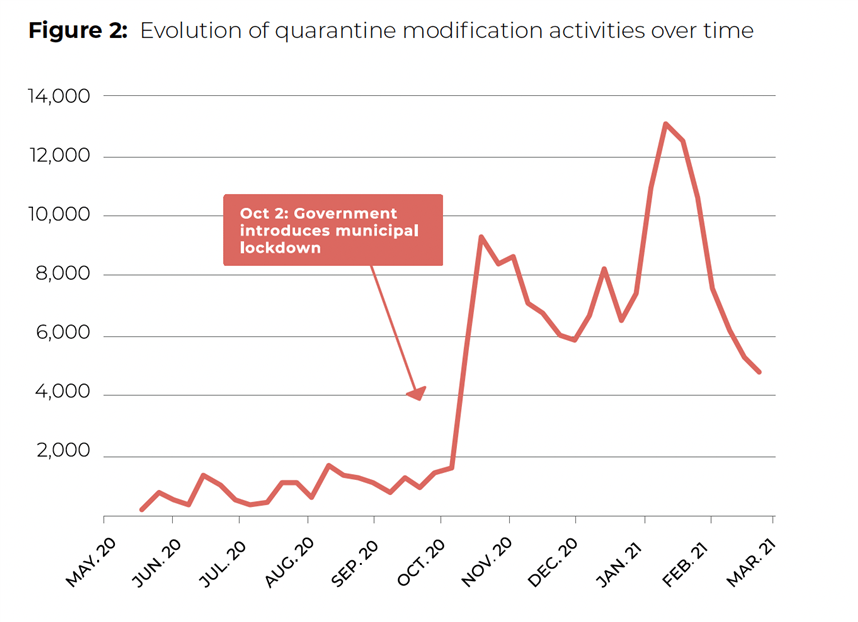- عربي
-
- share
-
subscribe to our mailing listBy subscribing to our mailing list you will be kept in the know of all our projects, activities and resourcesThank you for subscribing to our mailing list.
How Have Municipalities Interacted with the IMPACT Platform?
As Lebanon was coping with the COVID-19 pandemic, municipalities were placed at the forefront of the management of infection outbreaks. To streamline the communication between central and local authorities, the Central Inspection launched in April 2020 IMPACT, the country's first e-government platform. Due to the critical situation in which they are, almost all municipalities and mukhtars responded to the request and have accessed the platform at least once, although not on a constant basis over time.
The IMPACT platform tasked municipalities and mukhtars to report on a range of issues including COVID-19 metrics and decisions, development indicators, their needs, and their vulnerable households. Between April 2020 and February 2021, the interaction of municipalities with the IMPACT platform was largely limited to two forms: The Ministry of Social Affairs’ (MoSA) aid form, known as the vulnerable household survey, and the quarantine modification form, which is where municipalities reject the registration of new COVID-19 cases in their areas.
submitting aid applications gives municipalities direct benefits ... [and] help decrease social tensions and reenergize clientelist channels
Both forms present potential benefits in the view of municipalities. Indeed, submitting aid applications gives municipalities direct benefits at the political, economic, and social levels by offering financial support to vulnerable households, which could help decrease social tensions and reenergize clientelist channels. And when municipalities reject the registration of new COVID-19 cases in their areas, it can help delay or hedge municipal lockdowns, particularly after the government adopted a decentralized lockdown strategy between October and November 2020.
Incentives drive municipalities’ inconsistent interaction
At the national level, municipalities used IMPACT the most during the early stages of its launch: Nearly one half of all forms (48%) were submitted in April 2020 alone, followed by 8% in May. The peak in form submissions, particularly in April 2020, coincides with a three-week window set on filling out MoSA aid applications. In fact, of the total forms registered in the month of April, 99% were vulnerable household surveys. These served to help the government target eligible households for cash-assistance under the National Social Solidarity Program—a six-month cash-transfer program introduced exceptionally during the pandemic by the Presidency of the Council of Ministers and MoSA. The program, however, faced a number of delays due to bureaucratic processes and the audit and verification of the list of beneficiaries.
figure 1

figure 2

Lesson learned
Lebanon’s local governments have shown cooperation with the IMPACT platform and enabled residents, the primary stakeholders, to follow their activities. However, our research revealed that some municipalities had frequented IMPACT forms that carried short-term incentives over others that did not, leaving an inconsistent interaction with the platform. As the role and importance of access to accurate information continue to grow today, municipalities and central authorities must be impartial and pro-active in cooperating with open-data initiatives that serve to rebuild citizens’ trust in state institutions.
Related Output
view allFrom the same author
view all-
09.21.23
مشروع موازنة 2023: ضرائب تصيب الفقراء وتعفي الاثرياء
وسيم مكتبي, جورجيا داغر, سامي زغيب, سامي عطاالله -
02.05.25eng
أزمة لبنان بنيوية، لا وزارية
سامي زغيب, سامي عطاالله -
10.12.22eng
فساد في موازنة لبنان
سامي عطاالله, سامي زغيب -
10.15.24eng
لا عدالة مناخية في خضمّ الحروب
منى خشن, سامي عطاالله -
06.14.24
عطاالله: التدّخل السياسي عقبة أمام تطوّر الإدارة العامة
سامي عطااللهمقابلة مع مدير مبادرة سياسات الغد الدكتور سامي عطاالله أكد أن "التدخل السياسي هو العقبة الرئيسية أمام تطور الإدارة العامة"، وشدد على أن دور الدولة ووجودها ضروريان جدًا لأن لا وجود للاقتصاد الحر أو اقتصاد السوق من دونها"
اقرأ
More periodicals
view all-
01.15.26
ازدواجيّةُ المعايير لدى مُصنِّعي الإسمنت في لبنان: بين استخراج الموارد وحماية المشهد الطبيعيّ
منى خشنمن «الأحزمة الخضراء» إلى «المحميّات الطبيعيّة»، تعمل عمالقة صناعة الإسمنت في لبنان على تلميع صورتها البيئيّة فيما تواصل تشويه المشهد الطبيعيّ وإضرار الصحّة العامّة. إنّ إزدواجية المعايير البيئيّة لدى «الشركة الوطنيّة للإسمنت»، و«هولسيم»، و«سبلين» قد تتحوّل إلى بديل عن العدالة والمساءلة. اقرأوا مقالنا الجديد من كتابة الزميلة الأولى في مبادرة سياسات الغد د. منى خشن.
اقرأ -
12.19.25
المقالع تقضم الجبال: صناعة نظام اللاقانون
نزار صاغية, رين إبراهيمتضخّـم قطاع المقالع بعد عام 1990 بشكلٍ عشوائيّ، وتحوّل في معظمه إلى احتكارات تابعة لقوى نافذة تعمل خارج القانون. توثّـق هذه الورقة كيف تَشكّـل نظام اللاقانون في هذا القطاع، وما خلّفه من أضرار بيئيّة وماليّة واجتماعيّة، والدور الذي لعبته المواجهة القانونيّة–القضائيّة في إحداث أثر فعليّ على الأرض. ورقة بحثيّة من كتابة نزار صاغية ورين إبراهيم، ضمن مشروع “المناخ والأرض والحقّ” بالتعاون مع مبادرة سياسات الغد.
اقرأ -
11.21.25
وصفة لتبييض المسؤوليات في مجال الصرف الصحّي: الخلل في الصرف الصحي نظاميّ أيضًا
نزار صاغية, فادي إبراهيمتقدّم هذه الورقة خلاصةً دقيقة لتقرير ديوان المحاسبة الصادر في 27 شباط 2025 بشأن إدارة منظومة الصرف الصحّيّ في لبنان، مبيّنةً ما يعتريه من عموميّة وقصور، وما يكشفه ذلك من خللٍ بنيويّ في منظومة الرقابة والمحاسبة ومن الأسباب العميقة لتعثر محطّات معالجة الصرف الصحّي.
اقرأ -
04.24.25
اقتراح قانون إنشاء مناطق اقتصادية تكنولوجية: تكنولوجيا للبيع في جزر نيوليبرالية
المفكرة القانونية, مبادرة سياسات الغدتهدف هذه المسوّدة إلى تحقيق النمو الاقتصادي وخلق فرص عمل، غير أنّ تصميمها يصبّ في مصلحة قلّة من المستثمرين العاملين ضمن جيوب مغلقة، يستفيدون من إعفاءات ضريبية وكلفة أجور ومنافع أدنى للعاملين. وبالنتيجة، تُنشئ هذه الصيغة مساراً ريعيّاً فاسداً يُلحق ضرراً بإيرادات الدولة وبحقوق الموظفين وبالتخطيط الإقليمي (تجزئة المناطق). والأسوأ أنّ واضعي السياسات لا يُبدون أيّ اهتمام بتقييم أداء هذه الشركات أو مراقبته للتحقّق من تحقيق الغاية المرجوّة من المنطقة الاقتصاديّة.
اقرأ -
02.05.25eng
أزمة لبنان بنيوية، لا وزارية
سامي زغيب, سامي عطاالله -
10.15.24eng
لا عدالة مناخية في خضمّ الحروب
منى خشن, سامي عطاالله -
06.14.24
عطاالله: التدّخل السياسي عقبة أمام تطوّر الإدارة العامة
سامي عطااللهمقابلة مع مدير مبادرة سياسات الغد الدكتور سامي عطاالله أكد أن "التدخل السياسي هو العقبة الرئيسية أمام تطور الإدارة العامة"، وشدد على أن دور الدولة ووجودها ضروريان جدًا لأن لا وجود للاقتصاد الحر أو اقتصاد السوق من دونها"
اقرأ -
10.27.23eng
تضامناً مع العدالة وحق تقرير المصير للشعب الفلسطيني
-
09.21.23
مشروع موازنة 2023: ضرائب تصيب الفقراء وتعفي الاثرياء
وسيم مكتبي, جورجيا داغر, سامي زغيب, سامي عطاالله -
09.09.23
بيان بشأن المادة 26 من مشروع قانون الموازنة العامة :2023
المادة ٢٦ من مشروع موازنات عام ٢٠١٣ التي اقرها مجلس الوزراء تشكل إعفاء لأصحاب الثروات الموجودة في الخارج من الضريبة النتيجة عن الأرباح والايرادات المتأتية منها تجاه الدولة اللبنانية. بينما يستمرون في الإقامة بشكل رسمي في لبنان ويتجنبون تكليفهم بالضرائب بالخارج بسبب هذه الإقامة. كما تضمنت المادة نفسها عفواً عاماً لهؤلاء من التهرب الضريبي. وكان مجلس الوزراء قد عمد إلى تعديل المادة 26 من المشروع ال مذكور، فيما كانت وزارة المالية تشددت على العكس من ذلك تماماً في تذكير بالمترتبات والنتائج القانونية والمالية الخطرة لأي تقاعس أو إخلال في تنفيذ الموجبات الضريبية ومنها الملاحقات الجزائية والحجز عىل الممتلكات و الاموال. واللافت أن هذا الإعفاء الذي يشمل ضرائب طائلة يأتي في الفترة التي الدولة هي بأمس الحاجة فيها إلى تأمين موارد تمكنها من إعادة سير مرافقها العامة ومواجهة الأزمة المالية والإقتصادية.
اقرأ -
08.24.23
من أجل تحقيق موحد ومركزي في ملف التدقيق الجنائي
في بيان مشترك مع المفكرة القانونية، مبادرة سياسات الغد، كلنا إرادة، وALDIC، نسلط الضوء على التقرير التمهيدي الذي أصدره Alvarez & Marsal حول ممارسات مصرف لبنان وأهميته كخطوة حاسمة نحو تعزيز الشفافية. ويكشف هذا التقرير عن غياب الحوكمة الرشيدة، وقضايا محاسبية، وخسائر كبيرة. إن المطلوب اليوم هو الضغط من أجل إجراء تدقيق جاد وموحد ومركزي ونشر التقرير رسمياً وبشكل كامل.
اقرأ -
07.27.23
المشكلة وقعت في التعثّر غير المنظّم تعليق دفع سندات اليوروبوندز كان صائباً 100%
-
05.17.23
حشيشة" ماكينزي للنهوض باقتصاد لبنان
-
01.12.23
وينن؟ أين اختفت شعارات المصارف؟
-
10.12.22eng
فساد في موازنة لبنان
سامي عطاالله, سامي زغيب -
06.08.22eng
تطويق الأراضي في أعقاب أزمات لبنان المتعددة
منى خشن -
05.11.22eng
هل للانتخابات في لبنان أهمية؟
كريستيانا باريرا -
05.06.22eng
الانتخابات النيابية: المنافسة تحجب المصالح المشتركة


